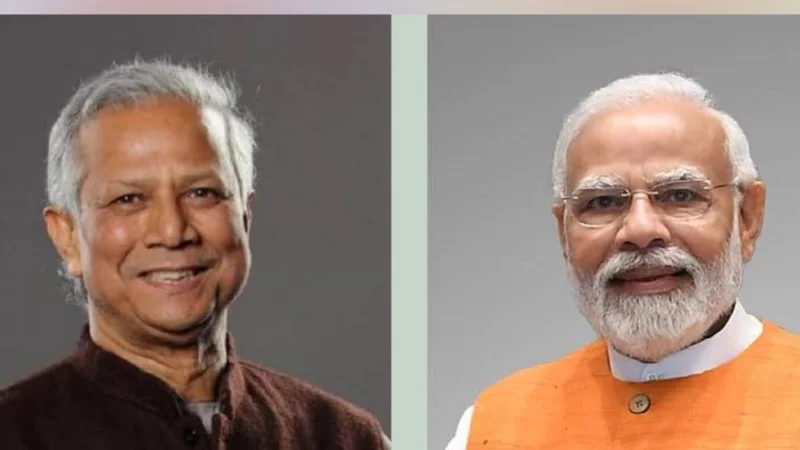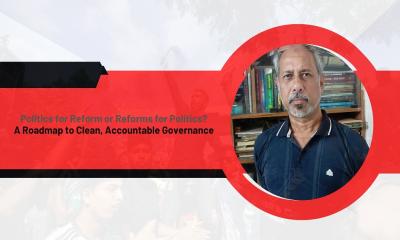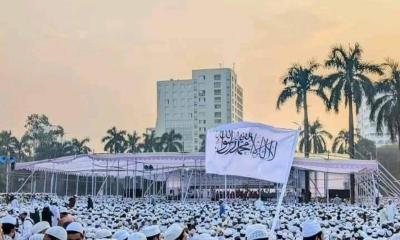India`s Prime Minister Narendra Modi appears unwilling to meet Muhammad Yunus, the head of Bangladesh`s interim government, due to a reluctance to discuss difficult issues such as the extradition of ousted leader Sheikh Hasina, analysts say.
Relations with Dhaka had become "a highly sensitive issue" for New Delhi as any high-level engagement with the interim government would require India to focus on matters it would much rather avoid discussing right now, said Michael Kugelman, director of the South Asia Institute at The Wilson Center in Washington.
"Chief among them is
Sheikh Hasina`s presence in India," he said, noting that the interim government wanted her extradited to Bangladesh while Delhi did not want to give her up given her close relationship with many of the country`s leaders.
"If Modi were to meet Yunus, it would be impossible to avoid discussing this issue."
ndian media reported last week that Delhi had yet to confirm whether it would heed Dhaka`s request for a meeting between Modi and Yunus, who are expected to be in New York for the United Nations General Assembly later this month.
Last month, in their first high-level contact, Yunus spoke on the phone with Modi and assured him that the interim government would "prioritise protection, safety and security of Hindus and all minority groups in Bangladesh".
However, Bangladesh`s Foreign Affairs Adviser Md Touhid Hossain said on Sunday the "regular procedure" for holding any meeting on the sidelines of the UNGA would have to be followed as such talks are not planned in advance.
Yunus was appointed last month after Hasina fled her country by helicopter to India on August 5, following a students-led revolution that overthrew her 15 years of iron-fisted rule.
On Sunday, Bangladesh`s International Crimes Tribunal said it was taking steps to secure the extradition of Hasina from India to face trial for the deadly violence waged by the authorities before she was unseated by mass protests in August.
Hasina was initially expected to remain in India for a short time, but reports have suggested that her attempts to seek asylum in the United Kingdom, the United States and the United Arab Emirates have not been successful so far.
Lailufar Yasmin, international relations professor at the University of Dhaka, said while a Modi-Yunus meeting would be "uncharted territory" for India, it would be better for Delhi the sooner the meeting took place.
"
has to start accepting the reality and engage with `Bangladesh 2.0` which was never in India`s equation," she said, adding that the first meeting should be aimed at recognising the "changed realities and thaw the ice" between the two countries.
India had placed its bets on the Awami League led by Hasina and had not attempted to "understand the pulse" of Bangladeshis, Yasmin said.
"It is time for India to realise that the relationship between the two countries cannot be channelled through only one political party," Yasmin said, describing the 53-year-old policy as "myopic" and one that had not allowed India to see beyond and "gauge the ground realities".
Yasmin said recent events should serve as a "wake-up call" for India to engage with its neighbours in a "fresh and novel manner".
Instead of "managing" South Asia, Delhi needed to obtain "consent" from the region if it hoped to emerge as a global leader, Yasmin added.
Hasina had maintained strong ties with India`s top leaders throughout her rule. Ten agreements were signed in areas ranging from maritime cooperation, digital partnership and rail connectivity to space technology during her visit to Delhi in July.
But her time in office had also been marked by accusations of forced disappearances, extrajudicial killings and repression of the opposition. She was also accused of having rigged the country`s last three general elections, including the latest in January that allowed her to secure a fourth consecutive term in power.
India, however, welcomed the election result, prompting many Bangladeshis to launch an "India out" campaign as they accused Delhi of supporting Hasina to protect its interests.
Sohini Bose, associate fellow at India`s Observer Research Foundation, said while Delhi worked well with the former Hasina government, the relationship was built on interdependence.
"That reality remains unaltered," she said, adding that the interim government and India would "inevitably" have to develop a functional relationship.
With diplomatic ties being "delicate" given the current political situation, Bose said decisions "cannot be rushed" and the best way to restore the relationship would be to focus on connectivity and energy projects.
Last November, the two countries inaugurated three major connectivity and energy projects built with India`s assistance, including a railway line to connect the neighbours.
Given the two countries` strong trade, security, and strategic interests, it would be difficult to pursue those interests - especially "high-stakes talks over border security" - if the relationship "goes into a deep freeze", Kugelman said.
Bangladesh is India`s biggest trade partner in South Asia, while India is the second-biggest trade partner of Bangladesh in Asia. Bangladesh exported US$1.97 billion of goods to India in the financial year 2023-24, while total bilateral trade stood at US$14.01 billion, according to India`s ministry of external affairs.
In the immediate term, Kugelman said the respective ambassadors of India and Bangladesh could work more closely with their host governments to help "pave the way for higher-level engagements".
There would still be limits to how far bilateral relations could go, he noted, given the profound changes the post-Hasina era had brought to Bangladesh politics.
With the Awami League "out of the picture" for the foreseeable future, Kugelman said the vacuum would be filled by "parties and entities given to criticism of, and in some cases outright hostility, towards India".
Dhaka could and should argue that these changed circumstances would not detract from its desire to have workable, "even if not warm", ties with Delhi, but Kugelman said that would be "a hard sell" given India`s concerns.
Ties were unlikely to be of the deep, strategic level of partnership India enjoyed in the Hasina era, he added.
"It will likely be more transactional and tactical."
This article originally appeared on the South China Morning Post (www.scmp.com), the leading news media reporting on China and Asia.
Copyright (c) 2024. South China Morning Post Publishers Ltd. All rights reserved.





-20251228011000.webp)




-20260225072312.webp)











-20260224075258.webp)













-20260219054530.webp)
-20260218060047.jpeg)
